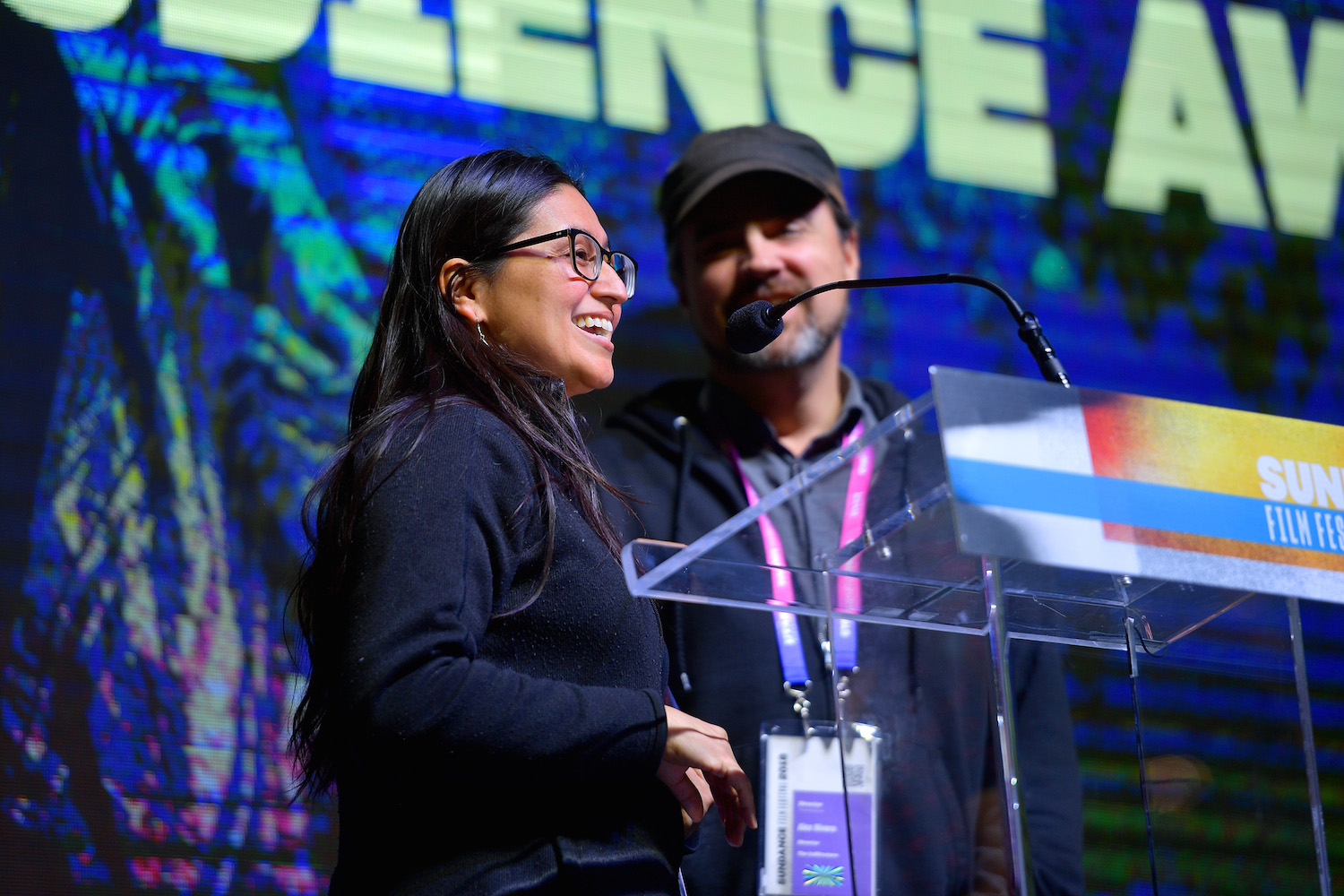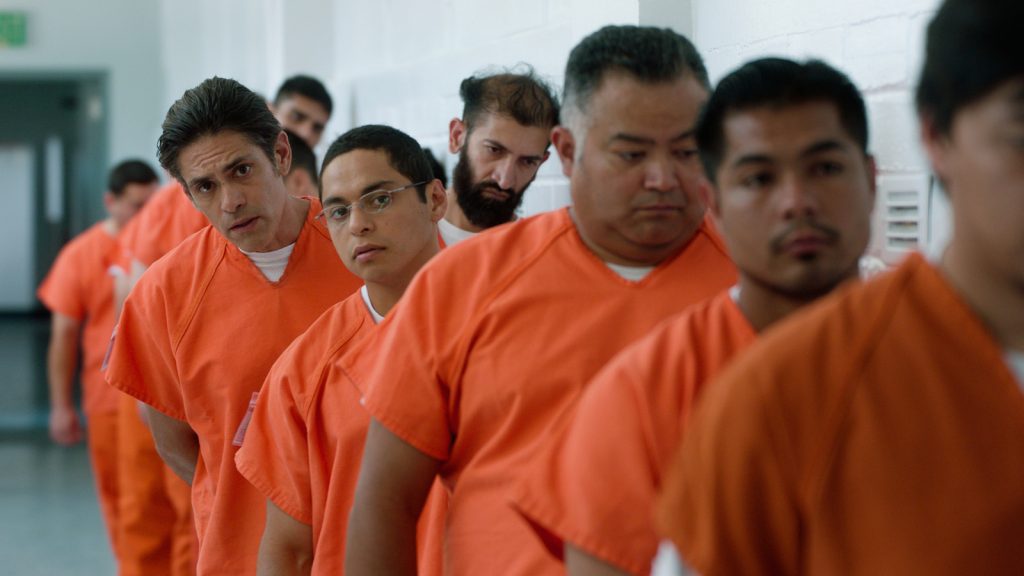Overcoming an internalized sense of powerlessness and purposely challenging systems of oppression is a shared struggle among all underrepresented, vilified, and marginalized groups. Unity, derived from grassroots organizing, remains one of the few antidotes for that overwhelming feeling that fighting back is futile. That’s exactly what the subjects in Alex Rivera and Cristina Ibarra’s docufiction hybrid The Infiltrators did.
Actively focused on stopping deportations during the Obama administration, the young men and women featured are DREAMers and part of the National Immigrant Youth Alliance (NIYA). Nearly a decade ago, Rivera first encountered the activists when their civil disobedience escalated and many were getting arrested. At the time, the director envisioned a short documentary that portrayed their grit and determination. But as NIYA’s tactics grew into more radical plans, he stopped editing and continued filming their story as it unfolded.
Getting detained by immigration agents, on purpose, served as a Trojan horse to attack injustice from within. With the initial intent of helping Argentinian family man Claudio Rojas (played by Manuel Uriza in the scripted segments), the undocumented youths infiltrated the Broward Transitional Center in Florida by sending one of their members, Marco Saavedra, inside to gather intelligence, spread information to other immigrant detainees, and coordinate a plan to free them, cleverly harnessing all legal avenues in their favor.
“They were taking a stereotype and using it to subvert the system,” Ibarra told Remezcla during the Sundance Film Festival, where the movie received the NEXT Innovator Award, as well as the Audience Award in that section.
Their approach of using performance as a tool in their arsenal of tactics fascinated Ibarra. In order to get apprehended, Saavedra and later Viridiana Martinez, who got herself locked up on the female side of the detention center, dressed and acted in accordance with the clichéd image of undocumented individuals. The agents fell for it, outsmarted via their own biases.
“The Infiltrators shows we’re not powerless. We can fight back and we can be effective,” said Martinez regarding the message she hopes the project transmits to the millions in this country who are still relegated to obscurity. “We’re taking our agency back,” she continued. “We need allies and we need people to have our back and to be standing beside us, but not to speak for us.” If there is a saving grace to Trump’s election, Martinez thinks, is the visibility it has provided to social justice issues that have existed for decades.

Another undocumented NIYA organizer highlighted in the hybrid narrative is Mohammed Abdollahi, an Iranian-born young leader who is aware of the isolation and shame that people in his situation, in the Middle Eastern community and beyond, experience. “I’ve taken on to be even more out with my status because I know there’s folks that feel like they have no options,” he said.
According to Abdollahi, Broward was the ideal detention center to target because it exemplified the diverse array of people suffering because of the immigration system. “This isn’t just a Latino issue and we are all affected the same way,” he said. “It was really a showcase of people coming together from many different cultural backgrounds to trust one another and to show what’s possible.”
Unable to shoot inside an actual detention center, the directors opted for mixing genres and fabricating through cinema what they could not get directly from reality. “The story needed an innovative approach because it’s about people who go into a place where you can’t film,” said Rivera, whose feature debut, 2008’s Sleep Dealer, examined a similar problematic with a sci-fi angle.
For Ibarra, whose career has concentrated in the non-fiction arena with personal tales on biculturalism such as Las Marthas, joining creative forces with Rivera and experimenting with scripted material felt organic since their objective was identical. “We come from families of border crossers, so we have an inclination towards similar themes; we just handle them in different ways,” she explained.
To recreate the Broward center, Rivera and Ibarra employed memory workshops with Martinez, Saavedra, and Rojas, who’d witnessed it firsthand, asking them to recall specific distances between things, colors, and other sensorial qualities of the spaces they inhabited during their time there. Though pleased with the final result, Martinez candidly noted the one characteristic that can’t be replicated is the unpleasant odor that permeated the halls.
Using the Freedom of Information Act, the filmmakers were able to garner more data and went to build their set inside a decommissioned mental health institution in Pomona, California known as the Lanterman Developmental Center. Stylistically The Infiltrators juxtaposes the sleek and luminously photographed sequences shots on set, with documentary footage from NIYA’s makeshift headquarters and talking head interviews with its protagonists.

Aside from replicating the physical environment in a detention center, to keep the hybrid form working on an emotional level the production had to hire actors that physically resembled their real-life counterparts, but more importantly that could embody their essence. With the help of casting director Carla Hool, 24 roles were cast in two weeks. Atop that list were Chelsea Rendon, who stars as Martinez, and Maynor Alvarado as Saavedra. Both were moved and empowered by conversations with the activists they were portraying, and fully aware of the responsibility this venture came with.
“It is so important for people of the United States of America, land of the free, to witness the bravery of this undocumented organization, our very own Avengers, take on this government until we make it right,” said Alvarado on what drew him to The Infiltrators.
Rendon, who considers Martinez a heroic figure, has faced her own obstacles as a Latina actress in an industry still far from accessible for people of color. “It’s a great time to be in the business, but it’s also hard trying to stay away from the stereotypes,” said Rendon. The actress currently stars in Tanya Saracho’s Starz critically acclaimed show Vida, where she plays Mari, a character that’s misinterpreted in telling ways depending on who’s watching.
“I’m an activist, but people look at the way I dress [in the show] and they’re like, ‘Oh that chola from Vida? And I’m like, ‘No, I’m an activist. Yeah, I have an edge, but that’s part of my personality,” she commented. “Hollywood is scared to do anything different.”
As Latino directors without access to government funds and support like their peers in Latin America, Rivera and Ibarra have encountered roadblocks to their artistic pursuits that have prevented them from being as prolific as the could be. “The film industry has a Latino crisis broadly,” said Rivera. The notion that the success of Cuarón, Iñárritu, and del Toro trickles down to US-born Latinos working in film is preposterous, he believes.
“The Three Amigos are from Latin America and come out of the best film schools in Latin America. God bless them, but that’s sort of separate from the struggle of US Latinos to find a space in the cinema here. For Latino writers and directors here in the US, the odds are against us,” Rivera firmly stated.

Despite the acclaim Sleep Dealer enjoyed, resulting in Rivera being signed by CAA at one point, his commitment to crafting elevated genre cinema that’s exciting, seductive, and that is removed from narratives involving gangbangers or drugs was not embraced by Hollywood. “I want to make Latino films that are critical, that are intellectual, that are political, that take risks. We were trying to say you can make a heist film. You can make the Ocean’s 11 set in a detention center.”
Although she finds herself divorced from the profit-driven entertainment apparatus given that her documentaries have mostly been broadcast on public television, Ibarra is of the idea that more opportunities for creators like herself and Rivera would render a pool of content full of diverse Latino perspectives. “The mid-career filmmaker needs support in testing out new ways of telling stories because there’s this idea of what a Latino film is or should be,” she noted.
On the subject of on-screen representation, Rivera is critical of popular properties like Netflix’s Narcos and Sony’s Sicario franchise, because they validate the messaging Trump, and those who think alike, deliberately feed the general public. “Can’t our creative community explore incredible drama in other places?” he asked referring to the fact that these technically proficient action-dramas utilize Latino talent in front and behind the scenes to perpetuate harmful assumptions and racist ideologies.
High on his list of questionable productions is Matthew Heineman’s Oscar-nominated Cartel Land, which Rivera described as “a beautifully made film,” but one that shouldn’t be celebrated. “I call it a piece of Trumpian poetry,” he added. “[It] lionized the wrong side of this conflict. They made heroes out of the racist vigilantes.” Since its release, Heineman’s documentary has been promoted on the Arizona Border Recon’s website, effectively being used as propaganda by its anti-immigrant membership.
In response to these hostile portrayals, The Infiltrators plays as resounding counterprogramming by championing Latino excellence and fearless rebellion in the form of nonviolent direct actions. “We’re here to push back and to tell a story in which immigrants are hacking the system and are smarter than their opponents,” explained Rivera. “Immigrants not as victims, but as leaders, as visionaries.”







